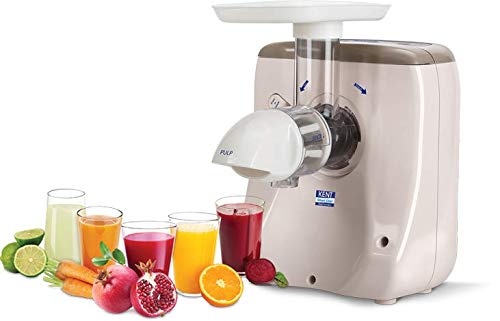Juicing is an excellent method to get more fruits and vegetables into your diet. It’s convenient, refreshing, and full of nutrients. However, with all the different types of juice makers available today, how do you know which one is most appropriate for you? The two most used models are centrifugal juicers and slow juicers, each with their own set of features and advantages. Knowing the important differences between the two will enable you to decide more smartly. Let’s break down each type of Juice Maker and see which one works best for you.
Centrifugal Juice Makers
Slow juicers or cold press juicers are slower working, as the name suggests, compared to centrifugal juicers, but offer many advantages. Slow juicer employs an auger or gear to crush and press fruits and vegetables instead of high-speed blades. Here are some features of centrifugal juicers:
- Fast Operation: Centrifugal juicers juice a variety of produce in seconds. For anyone who needs a quick glass of juice, these are ideal.
- Ease of Use: These Kitchen Appliances are user-friendly and easy to operate. Since they have big feed chutes, pre-cutting of vegetables and fruits is not required. They are therefore ideal for hectic mornings.
- Less Expensive: Centrifugal juicers usually cost less than slow juicers. They are perfect for those who are on a budget.
- Juice Quality: The fast blades create heat, which can cause nutrient loss (especially Vitamin C). Centrifugal juicers usually create juices that have more foam than slow juicers.
Slow Juice Makers
Slow juicers, also known as cold press juicers, operate more slowly than centrifugal juicers but offer several advantages. Slow juicer uses an auger or gear in place of high-speed blades to crush fruits and vegetables. Advantages and benefits of slow juicers are:
- Higher Nutrient Retention: Slow juicers have higher nutrient retention by limiting heat and oxidation, allowing maximum nutrient recovery.
- Better Juice Yield: Slow juicers retain more nutrients with minimal heat and oxidation, leading to greater nutrient extraction efficiency.
- Best for Leafy Greens and Hard Produce: They are very good at juicing leafy greens such as kale and spinach, which centrifugal juicers struggle with. They also do a better job with dense vegetables, like carrots and beets.
Which One Should You Choose?
When choosing between a centrifugal juicer and a slow juicer, it all depends on your priorities.
- Go for a Centrifugal Juicer if:
- You want speed and convenience.
- You don’t mind a loss of nutrients for a faster process.
- You intend to primarily juice vegetables and soft fruits.
- You want the best juicer available, but you’re on a tight budget.
- Go for a Slow Juicer if:
- You want juice quality and nutrients to be retained.
- You juice frequently and want higher yields of juice.
- You plan to juice leafy greens, wheatgrass, and hard vegetables like carrots and beets.
- You do not mind spending some time and some money to get the higher-quality juice.
Must Read: How Wet And Dry Vacuum Cleaners Provide Dual Cleaning Solutions?
 WhatsApp Us Now
WhatsApp Us Now




